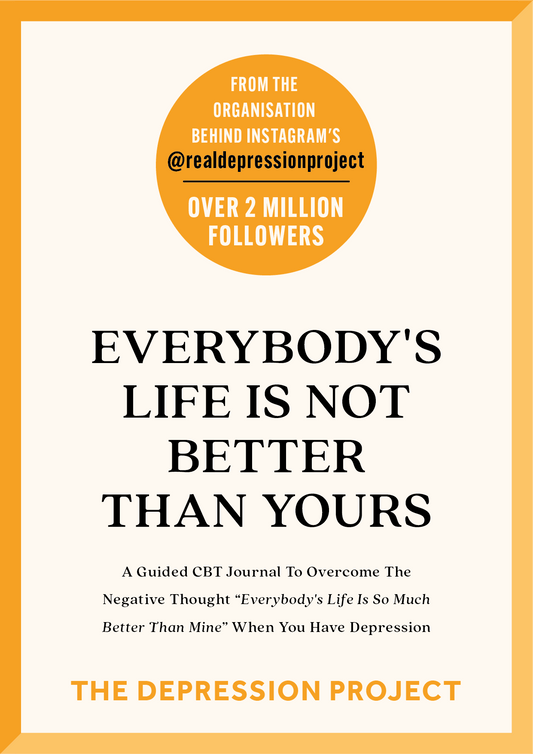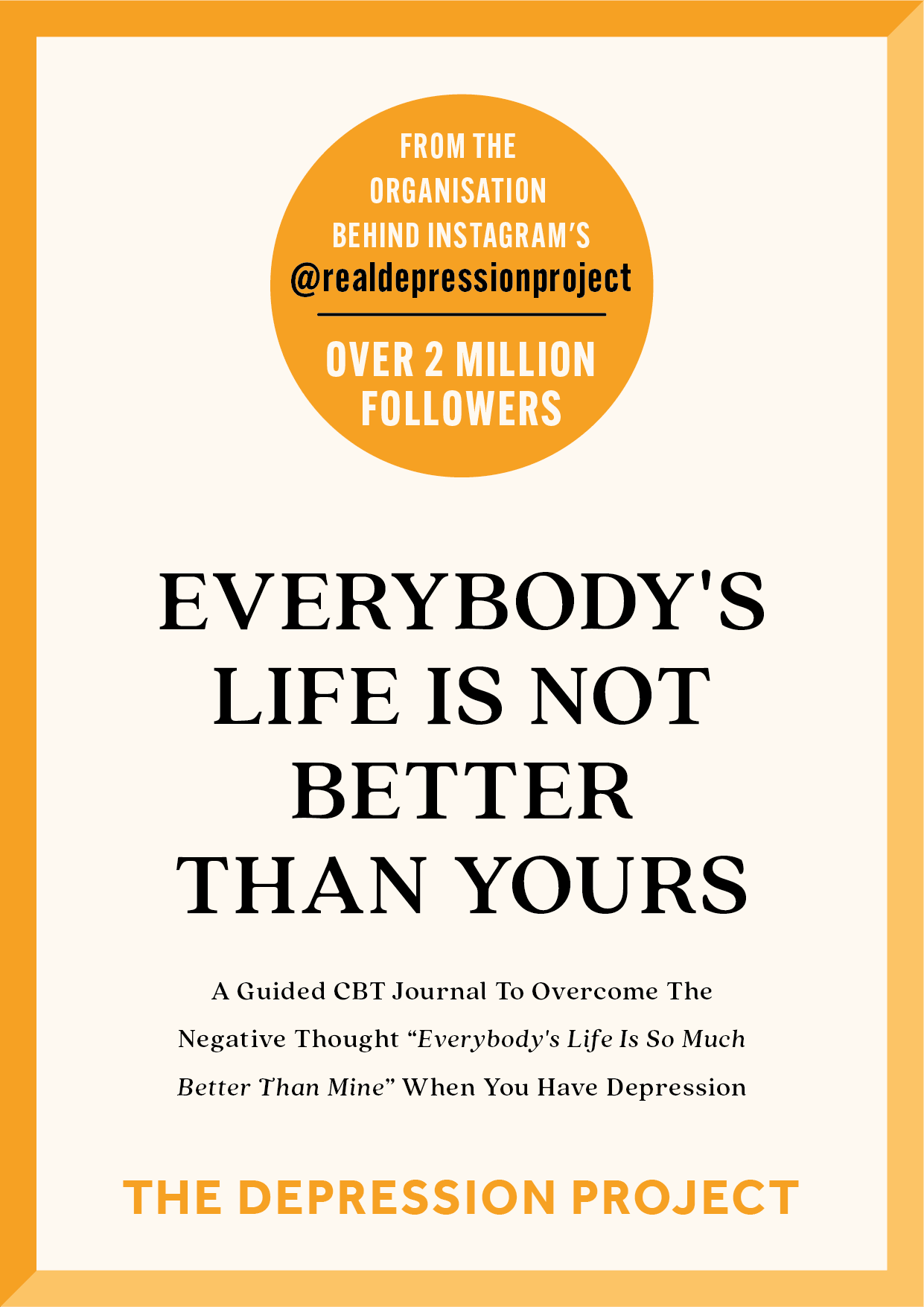
Do you at times find yourself thinking "everybody's life is so much better than mine"?
In early 2022, The Depression Project posed a question to our 3,000,000+ person social media community:
What negative thoughts are most commonly associated with depression, anxiety, and other mental health issues?
Thousands of people responded, and one of the most common negative thoughts people mentioned was:
“Everybody’s life is so much better than mine.”
In fact, the negative thought “everybody’s life is so much better than mine” can also be experienced by people who don’t have a mental illness, and thanks to social media these days, it’s one that people are arguably thinking more frequently than ever before.
However, the negative thought “everybody’s life is so much better than mine” is just that – a negative thought – as opposed to a fact. And, for this reason, we’ve put together this cognitive behavioural therapy-based journal, in order to help you:
- See for yourself that this negative thought is not true;
- Feel better about where you’re at in life.
Here’s A Breakdown Of Exactly What This Journal Will Cover
PART 1: Cognitive Behavioural Therapy Techniques To Help You Overcome The Negative Thought “Everybody’s Life Is So Much Better Than Mine” Anytime It Is Triggered
In the first part of this journal, we’ll share with you a wide variety of tried, tested, cognitive behavioural therapy techniques to help you overcome the negative thought “everybody’s life is so much better than mine” anytime it is triggered.
Additionally, each technique we share with you will also be accompanied by one or more guided journal prompts - in order to help you think about how you could implement that technique as effectively as possible.
PART 2: Practicing “Radical Acceptance”
Like we mention in Part 1, for some people, the negative thought “everybody’s life is so much better than mine” is being fuelled by a difficult, painful, challenging experience that has taken place or is currently taking place in their lives. For example:
- Losing a job and being unemployed;
- Being hurt or mistreated by someone;
- Heartbreak;
- Financial struggles;
- Being diagnosed with an illness.
If you can relate, then in order to free yourself from the negative thought “everybody’s life is so much better than mine”, it can really help to practice what’s known as radical acceptance.
Radical acceptance involves accepting that a difficult, painful, challenging situation unfortunately is what it is, and, rather than continuously wishing that it wasn’t so, wishing that you were someone else who doesn’t have this problem, and/or telling yourself how bad your life is and how everyone else’s life is so much better, instead trying your best to focus your attention on how you can healthily deal with the situation, and move forwards as effectively as possible.
Why is this worth doing?
Because, when you’re going through a difficult, challenging, painful experience, as natural, understandable and human as it can be to wish that things were different, to wish that you were someone else who doesn’t have these problems, and/or to keep on telling yourself how bad your life is and how everyone else’s life is so much better, doing so won’t actually fix or improve the situation you’re in. On the contrary, all it’s likely to do is add to your suffering, and divert your attention away from fixing- or making the best of the circumstances you’re faced with.
Consequently, practicing radical acceptance is a more fruitful alternative. Not only can doing so help you to avoid a lot of this “additional suffering”, but by keeping you focused on how you can healthily deal with the situation you’re in as effectively as possible, it also gives you the best possible chance for a brighter future.
For these reasons, in Part 2 of this journal:
- We’ll explain in detail what radical acceptance is, what radical acceptance isn’t, and show you several examples of it being effectively implemented in practice;
- We’ll share a guided journal prompt with you in order to help you think about the ways in which you yourself could practice radical acceptance, and how doing so could help you overcome your negative thought “everybody’s life is so much better than mine”.
PART 3: Practicing Gratitude
Like we often talk about at The Depression Project, practicing gratitude is rich with benefits, including, among other things:
- Reduced levels of stress;
- Higher self-esteem;
- Higher levels of optimism;
- Improved peace of mind;
- A willingness to be more helpful;
- Increased ability to be patient;
- Strengthened relationships;
- Higher levels of emotional resiliency;
- Decreased likelihood of experiencing burnout;
- Reduced rumination;
- Improved quality of sleep;
- Improved physical health ;
- Reductions in depression and anxiety;
- Improved life satisfaction.
And, in addition to all of the above benefits, gratitude can also help to free you from the negative thought “everybody’s life is so much better than mine”. This is because when you’re making negative self-comparisons with others and concluding “everybody’s life is so much better than mine” as a result, your attention is focused largely (and often exclusively) on the aspects of your life that you don’t like and that you wish were different. Consequently, in order to help free yourself from this negative thought, it can be extremely effective to focus more of your attention on- and cultivate gratitude for the good aspects of your life (which, as you’ve likely experienced, if you’re struggling with depression, anxiety and/or another mental health issue, it’s common to feel detached from).
For this reason, in the third part of this journal, we’ll share a variety of guided journal prompts for you to think about and write out your response to - each of which are designed to help you cultivate more gratitude for the life you have.
PART 4: How To Stop Negatively Comparing Yourself To Other People
In addition to everything we cover in Parts 1-3 of this journal, another extremely important step you can take to help free yourself from the negative thought “everybody’s life is so much better than mine” is to break the pattern of negatively comparing yourself to other people. So, in the fourth and final part of this journal:
- We’ll break down the underlying reasons why people compare themselves to others, and even more importantly, how you can stop doing so;
- We’ll also share with you a variety of guided journal prompts - in order to help you think about how you can implement the steps we’ll share with you to stop comparing yourself to other people as effectively as possible.
FAQ #1: Why should I be confident this journal will help me?
This journal is grounded in cognitive behavioural therapy - which in case you don't know, is a leading form of treatment for depression, anxiety, panic attacks, phobias, personality disorders, and a wide range of other mental health issues.
Additionally, this journal is also written with the warmth, care, encouragement and insight that, with 3,000,000+ followers on social media, The Depression Project has become renowned for :)
FAQ #2: What format does this journal come in?
This journal is available in two different formats for you to choose from:
- PDF - which you will be able to download instantly after purchase, and then print out at your home, office or local printer.
- Paperback (if you live in the US or Canada) - which will be delivered to you within 4-8 business days. Shipping costs are US$7.95 within the US and CAD$14 within Canada. This shipping cost is a flat rate, so whether you order one journal, or multiple journals, the shipping cost will be the same (if you would like to, you'll find the option to add one or more other journals to your cart below so that you can save on shipping). Once your order has been shipped, you will be emailed a number so that you can track it.
FAQ #3: What if I give this journal a try but I don't like it?
We're extremely, extremely confident that you're going to find this journal immensely helpful. But, just in case you don't, the PDF version of this journal comes with a 60 Day, No-Questions-Asked, 100% Moneyback Guarantee!

If you have any questions about this journal, then please feel free to click here and contact us so that someone from our friendly team can answer them for you :)
Otherwise, we hope you choose to get this journal, because we know that you're going to find it really, really helpful!
All our love,
The Depression Project Team.
Format Options

